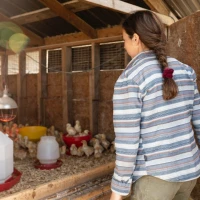Raising backyard chickens is becoming an increasingly popular pastime for many, with enthusiasts always seeking new ways to enhance the health and happiness of their feathered friends. A varied diet is key to achieving this, but it is crucial to discern which foods are safe and nutritious for chickens. Among the many questions that arise is, “Can chickens eat celery?” The answer isn’t merely a yes or no; it’s an uncovering of surprising benefits that this vegetable brings to your poultry pals.
In this comprehensive exploration, we delve into the world of chickens and celery, providing you with indispensable insights that will not only quench your curiosity but also arm you with practical knowledge for your avian husbandry adventures. Get ready to have your understanding of chicken nutrition soar to new heights!
The Nutritional Value of Celery for Chickens
Celery—the crunchy, low-calorie vegetable often associated with diet food—holds more than meets the eye when it comes to nutritional benefits, especially for chickens. Let’s unpack this bundle of green goodness and see what it can do for your flock.
Vitamins and Minerals in Celery
Celery is packed with vital nutrients that are beneficial to poultry. Each stalk offers:
- Vitamin A: Essential for maintaining good vision, growth, and immune function.
- Vitamin K: Plays a crucial role in blood clotting and bone health.
- Vitamin C: Although chickens produce Vitamin C naturally, extra from celery can aid during stress or extreme temperatures.
- Folate: Supports feather growth and genetic material development.
- Potassium: Necessary for proper heart function and muscle activity.
Celery’s High Water Content
One of the notable aspects of celery is its high water content. On sweltering days or when there’s concern about dehydration, celery can serve as a refreshment that also provides both entertainment black and white chicken nutrients.
Hydration for Chickens
Hydration is as vital for chickens as it is for humans. Adding celery to your chickens’ diet can chickens eat mango help to ensure they get enough fluids during the day, maintaining their overall health.
Is Celery Safe for Chickens to Consume?
It’s pivotal to ascertain the safety of any food before offering it to your chickens, and celery is no exception. It’s reassuring to know that celery is, in fact, safe for chickens to eat. However, due to its fibrous nature, a few considerations must be adhered to.
Potential Risks and Concerns
Choking Hazard:
- Celery strings can be tough and might pose a choking hazard to chickens if not prepared properly.
Pesticide Exposure:
- Like all produce, celery may carry pesticide residues. Opting for organic celery or thoroughly washing the stalks before serving them can alleviate this concern.
Preparing Celery for Your Chickens
To safely introduce celery into your chicken eating mangos’ diet, preparation is key. Here’s how you can serve celery to your flock:
- Chop it up: Cut celery into small, manageable pieces to prevent choking.
- Mix with other foods: Combine chopped celery with grains or other vegetables for a varied and attractive meal.
Incorporating Celery into a Balanced Chicken Diet
While celery is nutritious, it should not replace the primary diet of can chickens have cabbage, which is usually commercial feed that is specifically formulated for poultry. Celery should be regarded as a supplement—an extra source of nutrition and enjoyment for your chickens.
Variety is the Spice of Life—and Chicken Diets!
Aim to provide a medley of foods to keep your chickens healthy and interested in their feed. This can chickens eat cabbage include:
- Grains
- Vegetables
- Occasional fruits
- Adequate protein sources
Note: Treats should make up no more than 10% of a chicken’s diet to avoid nutritional imbalances.
How Often Can Chickens Eat Celery?
Moderation is essential in offering any treat or supplement, and celery is no exception. Chickens can enjoy celery a couple of times a week as part of a well-rounded diet.
The Rule of Moderation
Feeding your chickens too much celery can lead to:
- Nutrient imbalances: Excessive treats can disrupt the balance of nutrients chickens receive from their primary feed.
- Reduced feed intake: Chickens might fill up on treats and not consume enough of their balanced feed.
The Benefits of Celery for Your Flock’s Well-being
Chickens enjoy pecking and foraging, and celery can be a great way to stimulate these natural behaviors. Furthermore, the nutritional profile of celery can enhance your chickens’ vitality in several ways:
- Gut Health: The fiber in celery can aid in digestion and promote gut health.
- Bone Strength: With vitamins like Vitamin K in celery, bone health can be supported.
- Immune Support: The various vitamins in celery aid in supporting a chicken’s immune system.
The Dos and Don’ts of Feeding Celery to Chickens
When it comes to feeding chickens celery, there are several dos and don’ts to bear in mind to ensure the health and safety of your flock.
Do:
- Always wash celery thoroughly.
- Chop celery into bite-sized pieces to prevent choking.
- Monitor your chickens to ensure they are not having difficulty with the fibrous strings.
- Combine celery with other appropriate food scraps or treats for variety.
Don’t:
- Overfeed celery; it should be a treat, not a staple.
- Give your chickens celery that has begun to spoil.
- Forget to provide fresh water—hydration is always important.
Can Chickens Eat Celery Leaves and Seeds?
The entirety of the celery plant can offer nutritional value, with some parts presenting unique benefits. Let’s examine if chickens can enjoy the leaves and seeds as well.
Celery Leaves
- Safe and Nutritious: Packed with the same vitamins and minerals as the stalks, leaves can be a good treat.
- Preparation: Just like the stalks, the leaves should be washed and chopped to minimize any risk.
Celery Seeds
- Usage Caution: While not toxic, seeds are not commonly fed to chickens and should be offered sparingly if at all.
Creative Ways to Feed Celery to Your Chickens
Introducing celery to your chickens can be a fun and interactive experience. Here are some innovative ideas to incorporate celery into your chickens’ diet:
- Hanging Treat: Hang a stalk of celery in the chicken coop for the chickens to peck at; it provides enrichment and exercise as they stretch to nibble on it.
- Frozen Celery Treats: Freeze chopped celery in water during hot weather for a refreshing snack.
- Celery Mash: Mix mashed celery with other veggies or grains for a delicious chicken feast.
Conclusion: Embracing Celery in Your Chickens’ Diet
“Can chickens eat celery?” has transformed from a simple inquiry into an exploration of the amazing contributions this vegetable can make to a chicken’s health and well-being. With thoughtful preparation and moderation, celery can be an excellent addition to your chickens’ varied diet.
By emphasizing balance, variety, and safe feeding practices, you can furnish your flock with a flavorful life, full of the vital nutrients needed to thrive. A flock that pecks at celery is a flock that revels in the joys of backyard poultry care—and now, you’re well-equipped to offer this gratifying green treat to your feathered companions with confidence.










